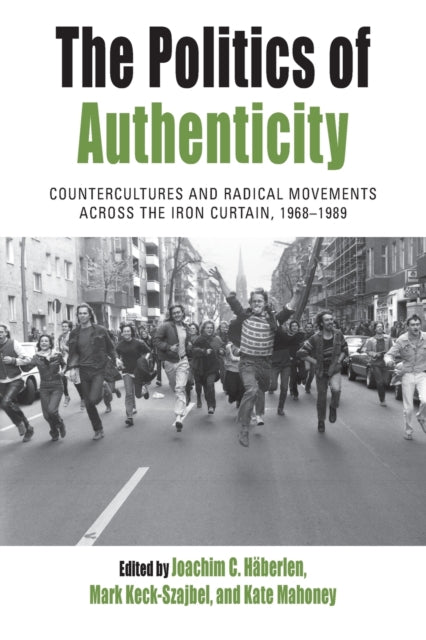Shulph Ink
Politics of Authenticity: Countercultures and Radical Movements across the Iron Curtain, 1968-1989
Politics of Authenticity: Countercultures and Radical Movements across the Iron Curtain, 1968-1989
YOU SAVE £3.84
- Condition: Brand new
- UK Delivery times: Usually arrives within 2 - 3 working days
- UK Shipping: Fee starts at £2.39. Subject to product weight & dimension
Bulk ordering. Want 15 or more copies? Get a personalised quote and bigger discounts. Learn more about bulk orders.
Couldn't load pickup availability
- More about Politics of Authenticity: Countercultures and Radical Movements across the Iron Curtain, 1968-1989
The search for authenticity among various social movements in Europe after the 1968 convulsions was a unifying factor, leading to the pursuit of self-understanding and the emergence of neoliberalism.
\n Format: Paperback / softback
\n Length: 308 pages
\n Publication date: 01 November 2020
\n Publisher: Berghahn Books
\n
Following the convulsions of 1968, one element that united many of the disparate social movements that arose across Europe was the pursuit of an elusive "authenticity" that could help activists to understand fundamental truths about themselves—their feelings, aspirations, sexualities, and disappointments. This volume offers a fascinating exploration of the politics of authenticity as they manifested themselves among such groups as Italian leftists, East German lesbian activists, and punks on both sides of the Iron Curtain. Together, they show not only how authenticity came to define varied social contexts but also how it helped to usher in the neoliberalism of a subsequent era.
The pursuit of authenticity was a driving force behind many of the social movements that emerged in Europe in the aftermath of 1968. Activists sought to understand their own feelings, aspirations, sexualities, and disappointments in order to connect with others on a deeper level and to challenge the dominant narratives of society. This volume explores the politics of authenticity as they manifested themselves among a range of groups, including Italian leftists, East German lesbian activists, and punks on both sides of the Iron Curtain.
One of the key themes that emerges from this exploration is the way that authenticity was used as a tool for political empowerment. Activists on the left, for example, sought to reclaim authenticity from the dominant capitalist discourse by embracing alternative modes of production, such as communism or socialism. They saw authenticity as a way of challenging the falsehoods of consumerism and materialism and of promoting a more egalitarian and democratic society.
Lesbian activists in East Germany, on the other hand, used authenticity as a way of challenging the state's repression of their sexuality. They sought to create a space for themselves where they could express their identities without fear of persecution or discrimination. Authenticity, for them, was a way of asserting their right to exist and to be recognized as equal members of society.
Punks, too, used authenticity as a way of challenging the dominant cultural norms of the time. They rejected the conformism and materialism of mainstream society and sought to create a subculture that was based on self-expression, creativity, and individualism. Authenticity, for them, was a way of rejecting the pressures of social expectations and of forging a new identity that was true to themselves.
However, the pursuit of authenticity was not without its challenges. Activists often faced opposition from those who saw their efforts as a threat to the status quo. They were accused of being counter-cultural or of promoting radicalism, and they were often subjected to surveillance and repression by the state.
Despite these challenges, the politics of authenticity continued to be a powerful force in the social movements of the 1970s and 1980s. Activists on the left, for example, continued to promote alternative modes of production and to challenge the dominant capitalist discourse. Lesbian activists in East Germany continued to fight for their rights and to create a space for themselves where they could express their identities. Punks, too, continued to create new subcultures and to challenge the dominant cultural norms of the time.
In conclusion, the pursuit of authenticity was a driving force behind many of the social movements that emerged in Europe in the aftermath of 1968. This volume offers a fascinating exploration of the politics of authenticity as they manifested themselves among a range of groups, including Italian leftists, East German lesbian activists, and punks on both sides of the Iron Curtain. Through their struggles, these activists helped to shape the political landscape of the 1970s and 1980s and to lay the groundwork for the neoliberalism that would dominate the world in the decades to come.
\n Weight: 426g\n
Dimension: 153 x 228 x 30 (mm)\n
ISBN-13: 9781789208245\n \n
This item can be found in:
UK and International shipping information
UK and International shipping information
UK Delivery and returns information:
- Delivery within 2 - 3 days when ordering in the UK.
- Shipping fee for UK customers from £2.39. Fully tracked shipping service available.
- Returns policy: Return within 30 days of receipt for full refund.
International deliveries:
Shulph Ink now ships to Australia, Belgium, Canada, France, Germany, Ireland, Italy, India, Luxembourg Saudi Arabia, Singapore, Spain, Netherlands, New Zealand, United Arab Emirates, United States of America.
- Delivery times: within 5 - 10 days for international orders.
- Shipping fee: charges vary for overseas orders. Only tracked services are available for most international orders. Some countries have untracked shipping options.
- Customs charges: If ordering to addresses outside the United Kingdom, you may or may not incur additional customs and duties fees during local delivery.


